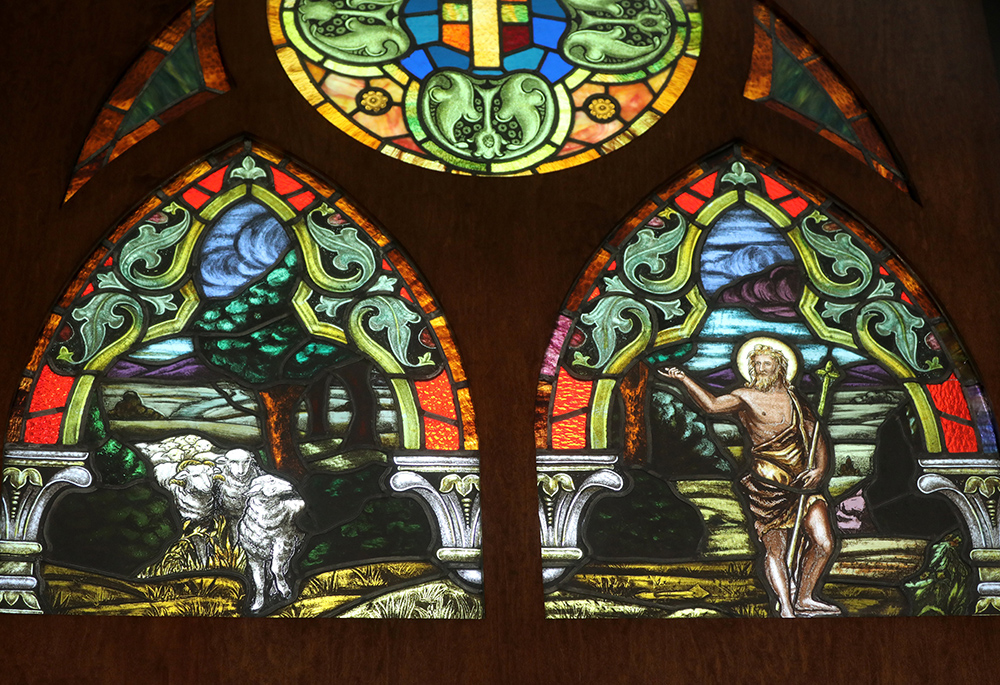
A stained glass image of Jesus the Good Shepherd is pictured at Jesus the Divine Word Church May 6, 2021, in Huntingtown, Maryland. (CNS/Bob Roller)
"Sheep without a shepherd." What an image.
Jesus and Jeremiah offer us complementary perspectives on sheep and shepherds. First, we hear Jeremiah rail against religious leaders who do everything except live up to their vocation. We might call them "anti-shepherds." They ignore flocks and leave them vulnerable to predators; they scatter the sheep; they keep vigil for their own comfort to the detriment of the lambs.
Jesus focuses on the sheep. He saw the hungry people. Even if they didn't really know what they were seeking, they knew that their religious leaders were leaving them in the desert.
Jesus and Jeremiah are looking at two sides of the same coin — the sheep are vulnerable because the shepherds are indifferent. Instead of guiding flocks to verdant pastures, these shepherds display their rods and staffs as symbols of their importance. They forget that their signs of office point them toward service, not status. Jesus describes them saying: "All their works are performed to be seen" (Matthew 23:1-7). Their kind of leadership leaves people in a state of religious famine.
Mark's description of the crowd seeking Jesus prepares for the Gospels we'll hear from now through the end of August. Our upcoming meditations on the sixth chapter of John will lead us through the miraculous sharing of food and Jesus' bread of life discourse. What often escapes our notice is that it all started with people who were hungry and Jesus' response to them.
Today's Gospel tells us that when Jesus was moved to compassion when he saw how the people were searching for him. (Although our translation says "pity," "compassion" is a better translation.) The word compassion (splagchnizomai in Greek) describes how a person is moved from the guts or womb. A person with such compassion feels like a mother with an injured child; she hurts more than the little one.
Jesus saw the crowd as sheep without a shepherd. They probably did not know one another any more than they knew what they were looking for. Compassion moved Jesus to feel their need, therefore, he began to teach them "many things." Jesus felt so deeply with the hungry people that he had to respond to them. In contrast to their woeful shepherds, he helped them get in touch with what their hearts desired.
The word compassion (splagchnizomai in Greek) describes how a person is moved from the guts or womb.
What did he teach? The only thing he ever taught was his living message about God's immeasurable love. The first example of that love was that he dropped everything to attend to them. Unlike an anti-shepherd, he recognized them as individuals, parts of a crowd that could become a community. They may not have known one another, but he saw them all as persons, unique and interrelated.
His preaching allowed each to feel that he was talking to him or her and all the while he was drawing them all together. Those who believed what he said, discovered that he satisfied a hunger so deep they may not have even known they had it.
Today we see multitudes of people who are like sheep without a shepherd. Some don't seek a shepherd because they have ignored or given up the search for ultimate meaning in their lives. Others may be buying advertising's promises that more is better or that the right product will bring them popularity and prosperity — they keep buying, never acquiring the one thing that answers their needs. Others, disoriented by the pace and magnitude of change, follow superficial shepherds who promise a return to an imaginary past that was safe and secure.
Advertisement
Today's crowds aren't chasing Jesus' boat. They're seeking unity in stadiums where they can shout with their fellow fans. They're enthralled by speakers who rile them up without saying anything of substance. They're marching against immigrants and others whose "differences" seem threatening. They're finding community in gangs and solace in addictive substances and practices. These are today's sheep without a shepherd, the people to whom followers of Christ are called to minister, the ones most in need, and often the ones who are most resistant to it.
What are we to do? In Fratelli Tutti Pope Francis' made this plea: "It is my desire that, in this our time, by acknowledging the dignity of each human person, we can contribute to the rebirth of a universal aspiration to fraternity."
This might sound too simple to be true. How could it affect systemic change? Francis isn't proposing instant global transformation, only growth in solidarity. He's talking about creating an atmosphere of compassion that can nudge the world toward embracing our unity so that we can eventually realize that we really are one flock with one really good shepherd.
